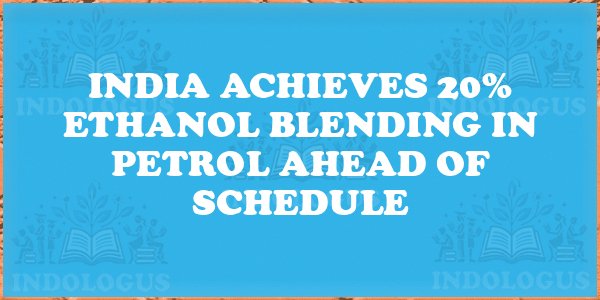India has surpassed its target by reaching 20% Ethanol Blending in petrol ahead of schedule, showcasing its dedication to clean energy and sustainable development goals. This milestone was achieved through policy support, infrastructure growth, and active participation from farmers.
Background: Ethanol Blending Programme (EBP)
The Ethanol Blending Programme (EBP) commenced in 2003 to decrease India’s reliance on imported oil, boost renewable energy usage, and bolster the domestic sugar and agriculture sectors. The programme has seen a steady increase in blending targets, hitting 10% in 2022 and now reaching the 20% milestone in 2025 well before the initial timeline.
Significance of the Achievement
The rise from 1.5% ethanol blending in 2014 to 20% in 2025 signifies a remarkable 13-fold increase in just 11 years. This achievement brings various advantages:
- Energy Security: Reduces reliance on imported fossil fuels.
- Foreign Exchange Savings: India saved ₹1.36 lakh crore by cutting crude imports.
- Environmental Gains: A decrease of 698 lakh tonnes of CO₂ emissions aligns with India’s climate goals under the Paris Agreement.
- Economic Impact: Boosts farmers’ and distillers’ income, fortifies the biofuel sector, and incentivizes agro-based industries.
Support to Farmers and Rural Economy
Since ethanol is primarily derived from sugarcane, a crop prevalent in rural India, the ethanol initiative ensures:
- Payment of ₹1.18 lakh crore to farmers, enhancing rural incomes.
- Payment of ₹1.96 lakh crore to distilleries, fostering rural industrial growth.
- The Union Cabinet’s recent approval of a price hike for molasses-based ethanol further encourages production and supports farmers.
Environmental and Climate Benefits
India’s ethanol promotion aligns with its goal of achieving net-zero emissions by 2070. Utilizing ethanol-blended fuel aids in:
- Reducing greenhouse gas emissions.
- Enhancing air quality in urban areas.
- Promoting sustainable agriculture by utilizing crop residues.
Key Takeaways for Competitive Exams
- India exceeded its ethanol blending target, showcasing commitment to clean energy and sustainability.
- The Ethanol Blending Programme aims to reduce oil dependence and support domestic agriculture.
- The achievement of 20% ethanol blending brings economic, environmental, and energy security benefits.
- The initiative supports farmers, rural economies, and aligns with India’s climate goals.




